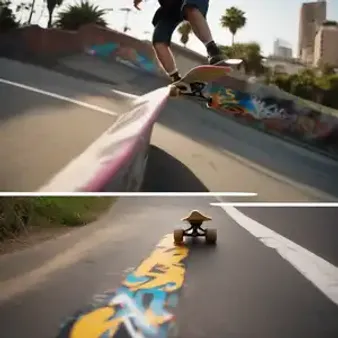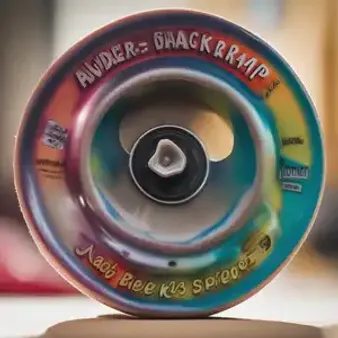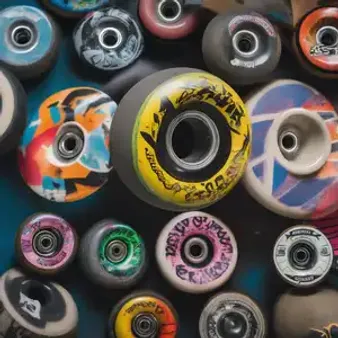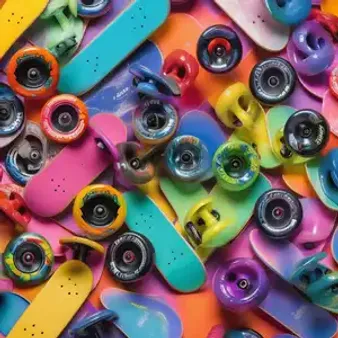Table of Contents
Navigating the world of skateboarding can feel like learning a whole new language, especially when it comes to understanding the different types of skateboard wheels. Whether you're a beginner finding your footing or a seasoned skater looking to upgrade, kizworld is here to break down everything you need to know about skateboard wheels. From size and durometer to shape and material, we'll help you choose the best wheels for your riding style and elevate your skateboarding experience.
Factor | Description | Impact on Performance |
|---|---|---|
Size (mm) | Diameter of the wheel | Larger wheels = more speed, smaller wheels = slower speeds, better for technical tricks |
Durometer (A) | Hardness of the wheel | Higher durometer = harder and faster, lower durometer = softer and grippier |
Shape | Profile of the wheel's riding surface | Varies from narrow to wide, impacting grip, speed, and maneuverability |
Material | Typically polyurethane | Different formulations affect performance characteristics like grip and durability |
Understanding Skateboard Wheel Size and Your Ride
How Big Should My Skateboard Wheels Be?
Choosing the right skateboard wheel size can feel like trying to pick the perfect pair of shoes – it all depends on what you're going to do! Wheel size is measured in millimeters (mm), and it directly affects your speed and how smoothly you roll over bumps and cracks. Imagine trying to ride a scooter with tiny wheels over a bumpy road - it'd be a wild ride! Bigger wheels (54mm and up) are like having monster truck tires - they're faster and better at handling rough surfaces. They're great for cruising, going downhill, or carving up bowls. Smaller wheels (52mm and under) are more like skateboard sneakers - they're slower but give you more control for flipping your board and doing tricks.
Smaller Skateboard Wheels: Your Ticket to Techy Tricks
If you're all about nailing those awesome kickflips and ollies, then smaller wheels are your new best friend. These little guys are like the ninjas of the skateboard world – quick, agile, and perfect for technical maneuvers. Because they sit lower to the ground, they offer a lower center of gravity, making it easier to pop your board up and land those impressive tricks. Plus, smaller wheels mean less weight, which is a game-changer when you're trying to execute lightning-fast flips and spins.
Larger Skateboard Wheels: Cruising in Comfort and Speed
Craving the feeling of the wind in your hair as you glide effortlessly down the street? Then larger wheels are your go-to choice. These bad boys are all about speed and a smooth ride. Think of them as the Cadillacs of skateboard wheels – they'll have you cruising over cracks and pebbles like they're not even there. Larger wheels are perfect for long-distance skating, bombing hills, and carving smooth lines in bowls and ramps. They might not be as nimble for technical tricks as their smaller counterparts, but they'll definitely get you where you need to go in style and comfort.
Wheel Size (mm) | Riding Style |
|---|---|
50-53mm | Street skating, technical tricks, beginners |
54-59mm | All-around skating, cruising, parks |
60mm and up | Longboarding, downhill riding, cruising on rough surfaces |
Understanding Skateboard Wheel Size and Your Ride
Deciphering Durometer: How Hard Should Your Skateboard Wheels Be?
Now, let's talk about durometer – the hardness of your skateboard wheels. Imagine biting into a gummy bear versus a jawbreaker. The gummy bear is soft and squishy, while the jawbreaker is hard and takes forever to eat! Skateboard wheels are kinda the same way. Durometer is measured on the "A" scale, and it usually ranges from 78A (super soft) to 100A (rock hard). Softer wheels are like the gummy bears – they grip the pavement better and give you a smoother ride over cracks. Harder wheels are like the jawbreakers – they're faster and slide easier, but you'll feel every bump in the road!
Softer Wheels (78A - 87A): Grip and Glide for Days
If you're just starting with skateboarding or love cruising around town, softer wheels are your best bet. They're like having built-in shock absorbers for your board! Softer wheels provide excellent grip, making them perfect for beginners still finding their balance. They also absorb vibrations from rough surfaces, giving you a smoother, more comfortable ride. Think of them as the comfy sneakers of the skateboard world – perfect for everyday adventures.
Durometer Range | Riding Style |
|---|---|
78A - 87A | Beginners, cruising, street skating, rough surfaces |
88A - 95A | Street skating, parks, ramps |
96A - 101A | Technical street skating, fast riding, parks, competitions |
Harder Wheels (96A - 101A): Speed Demons and Park Rats
Ready to unleash your inner speed demon or conquer the skatepark? Then harder wheels are calling your name! These bad boys are built for speed and performance. Harder wheels offer less rolling resistance, meaning you'll go faster with less effort. They also slide more easily, which is crucial for tricks like powerslides and reverts. However, keep in mind that harder wheels provide less grip and can be a bit bumpy on rough surfaces. It's like trading in your comfy sneakers for a pair of racing shoes – you'll gain speed but might sacrifice some comfort.
Deciphering Durometer: How Hard Should Your Skateboard Wheels Be?
Type of Skateboard Wheels: Choosing the Right Shape for Your Style
Now, let's talk about wheel shape – it's like picking the right tires for your skateboard! You've got different shapes like classic, street, and cruiser wheels. Classic wheels are like all-around sneakers – good for a bit of everything. Street wheels are like those cool, flat-bottomed skate shoes – perfect for tricks and grinding because they're wider and grippier. Cruiser wheels are like those comfy running shoes – smooth and fast for cruising long distances. Imagine trying to run a marathon in clunky boots – not fun, right? That's why choosing the right shape is key to having a blast on your board. For more tips on getting started, check out our guide on how to get started with skateboarding. And if you're curious about different skateboard types, we've got you covered there too! Check out our article about the difference between street and other skateboarding styles.
Wheel Shape | Best For |
|---|---|
Classic | Beginners, all-around skating |
Street | Technical tricks, street skating, parks |
Cruiser | Cruising, longboarding, smooth rides |
Type of Skateboard Wheels: Choosing the Right Shape for Your Style
Picking the Perfect Type of Skateboard Wheels: Factors to Consider
So, you've got your board, you're feeling hyped, but wait – what about the wheels? Choosing the right type of skateboard wheels is like picking the perfect shoes for a race. You wouldn't wear flip-flops to a marathon, would you?
Your Riding Style: Street, Park, or Cruiser?
First things first, think about what kind of skateboarding you're into. Are you all about hitting the streets, busting out tricks at the skatepark, or just cruising around town? Each style demands different wheel characteristics. If you're a street skater, you'll want smaller, harder wheels for quick turns and a stable base for those epic grinds. For park rats, go with slightly larger, softer wheels for more speed and a smoother ride on those ramps and bowls. And if cruising is your thing, larger, softer wheels will give you a comfy ride and help you glide over those pesky cracks in the sidewalk. It's like having built-in shock absorbers!
Wheel Type | Riding Style |
|---|---|
Small and Hard (50-53mm, 96A-101A) | Street skating, technical tricks |
Medium and Soft (54-59mm, 88A-95A) | Park skating, ramps, bowls |
Large and Soft (60mm and up, 78A-87A) | Cruising, longboarding, rough surfaces |
Terrain and Environment: Smooth Streets or Bumpy Backroads?
Next up, consider where you'll be shredding the most. Are you blessed with smooth skateparks and freshly paved streets, or are you battling bumpy backroads and cracked sidewalks? If you're lucky enough to ride on smooth surfaces, you can get away with harder wheels for more speed and a slicker feel. But if you're dealing with rougher terrain, softer wheels will be your saving grace. They'll absorb those bumps and vibrations, giving you a smoother ride and saving your ankles from feeling every single crack. It's like choosing between a mountain bike and a road bike – pick the one that suits the terrain. Just like when choosing the right skateboard, terrain matters. Learn more about selecting the perfect board in our guide on how to choose the right skateboard.
- Hard Wheels (96A-101A): Smooth surfaces, skateparks, speed
- Medium Wheels (88A-95A): Versatile, good for a mix of street and park skating
- Soft Wheels (78A-87A): Rough surfaces, cruising, comfort
Picking the Perfect Type of Skateboard Wheels: Factors to Consider
Final Thought
Choosing the right type of skateboard wheels can significantly impact your overall riding experience. By considering your riding style, the terrain you'll be skating on, and your personal preferences for speed, grip, and maneuverability, you can find the perfect wheels to enhance your performance and enjoyment. Remember that experimenting with different wheel sizes, durometers, and shapes can help you fine-tune your setup and discover what works best for you. So, get out there, try out some different options, and enjoy the ride!